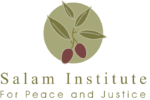The majority of disaffected youth in Chad attend Quranic schools rather than participating in the formal education sector. With generous support from the US Embassy in N’Djamena, this project seeks to bolster these centers of community life and resilience, engaging the local opinion leaders – Quranic School teachers – who have the highest access to and influence over the marginalized youth from the communities that are most susceptible to the social, economic, and political drivers of violent extremism. To achieve these objective, the Salam Institute will provide trainings and follow-up technical assistance to over 200 Quranic schools teachers in ten localities utilizing international and local trainers.
These Quranic School teachers will benefit from training and dissemination of the Quranic School Teachers manual, developed by the Salam Institute for Peace and Justice in 2010 in collaboration with the High Council for Islamic Affairs and local experts as part of the USAID-funded project Peace through Development I (PDev I). The manual is a resource for Quranic school teachers to integrate active learning methods that promote critical thinking into their classrooms alongside civic values such as tolerance, non-violence, and human rights rooted in Islamic and cultural traditions.

